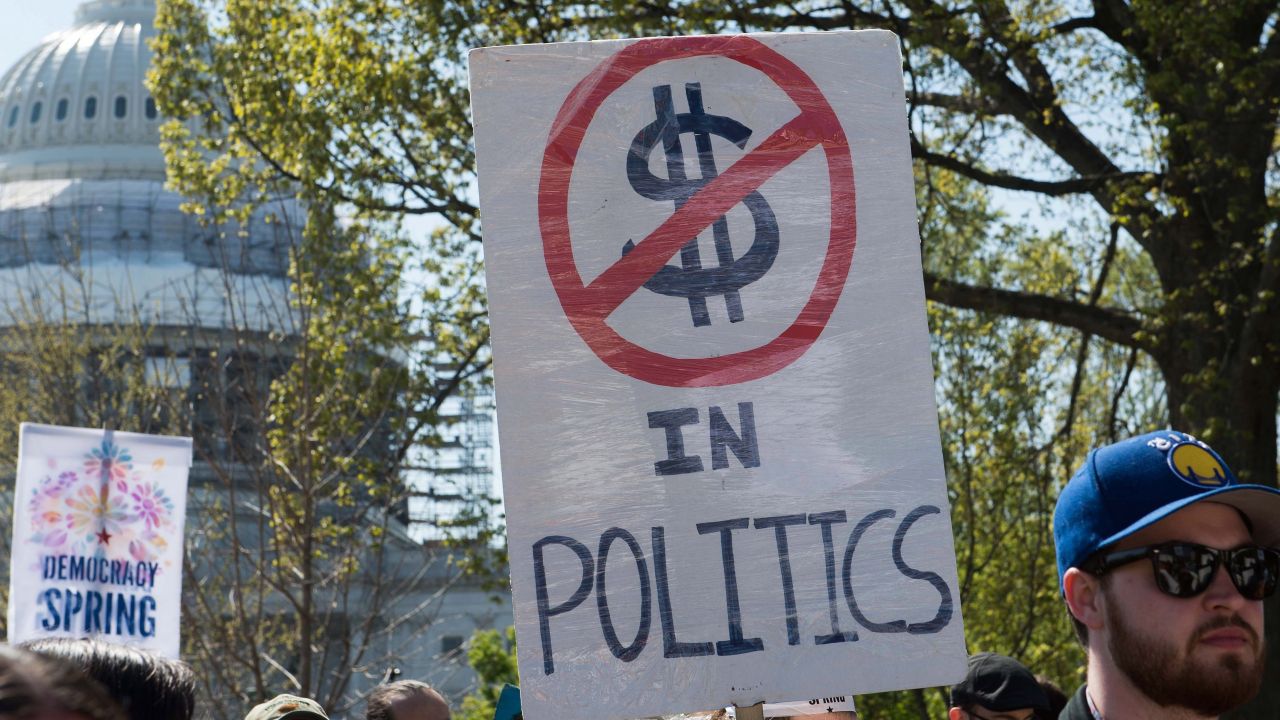
Democracy Spring activists marched on the US Capitol in April to demand expanded voting rights and restrictions on money in politics. (Photo: Nicholas Kamm/AFP/Getty Images)
Editor’s Note: Frances Moore Lappé, founder of the Small Planet Institute and an arrestee during April’s Democracy Spring demonstrations, and Adam Eichen, a fellow at the Institute, are writing a book on the Democracy Movement. As part of their research, they recently interviewed Sen. Sheldon Whitehouse, a Rhode Island Democrat whose father — as he alludes to in the interview — was a career Foreign Service officer who served as the US ambassador to Laos and Thailand. Whitehouse is a sponsor of the DISCLOSE Act, which would require sources of “independent” donations made to influence elections to be made public.
An overwhelming number of Americans believe money wields far too much power in politics and want fundamental reform in the way we fund our elections. Yet after two presidential debates and months of election coverage, this bipartisan concern — a key to resolving many other problems — has been virtually ignored. Nonetheless, there are some politicians calling for significant pro-democracy reforms. Whitehouse is one of them. We recently sat down with the Rhode Island Democrat about the issue and his efforts.
Frances Moore Lappé: We sense a real movement of movements beginning, what we think of as the Democracy Movement, with people across many issues uniting for real system reforms. Do you see this happening too, or does it sound like a pipe dream?
Sheldon Whitehouse: No, it’s not a pipe dream. It’s not easy for groups lobbying on different issues to see the commonality in why they’re not winning. But recognition of the problem is growing across a whole variety of progressive causes. When, if you are in my position, you can go in front of a crowd of people at a community dinner, and say, Citizen United and everybody in the room knows what you mean, now that’s a sign that people are tuned into the problem. This Supreme Court ruling, which unleashed money in campaigns, has a foothold in the public’s imagination. It’s easier for organizations to step in and take advantage of that foothold.
Maybe a year and a half ago, I saw a poll in which people were asked whether they thought an individual could get a fair shake against a corporation in the United States Supreme Court; and it was 9–to-1 negative. Among Republicans, it was 4-to-1. So even though the GOP controls the court, Republicans also have huge suspicion.
Lappé: It’s commonly assumed that America is divided, when there is actually so much agreement. Do you agree?
Whitehouse: There are plenty of Republicans who would be happy to sign up and negotiate a serious climate change bill, but the fossil-fuel lobby has been clever about applying its force against Republicans in Congress to create two things: first, a collapse of any Republicans’ support, and second, to have their special interest, special pleading, masquerade as a cultural partisan war. So, one party can shut down parliamentary action while at the same time hiding their own hand in the clutter that created such Republican-versus-Democrat partisanship. And obviously, it’s easier for them if everybody is going to say, “Oh, that’s just partisanship,” and they don’t see the guy in the corner with the club.
Adam Eichen: That’s very true. This year’s Democratic party platform contains some of the strongest language on democracy reform — from voting rights to campaign finance reform — in history. People want to say that platforms are just platitudes, but in terms of language, this is very good stuff.
Whitehouse: To a certain extent, platforms are platitudes that you test when you get to govern. You have to run those priorities up against the opposition and decide what’s most important. I think a lot of us have come to believe that unless we fix the process parts [the dominance of money in politics], we are going to be playing on the tilted playing field forever. It’s going to make doing everything you want to do twice as difficult. As you get the field back to the level, then everything else becomes much more manageable. On issues where 80 percent of the public supports doing X, you can actually do X, even though there is a special interest opposing it.
Lappé: So you feel that democracy reforms have a lot of support?
Eichen: Especially among your colleagues?
Whitehouse: I think people in Congress really do feel the process issues have been cooked against the public; and this makes life much more difficult for us. Citizens United has been a big reason for this shift.
— Sen. Sheldon Whitehouse (D-RI)
Eichen: Do you find a big base of your voters care about these issues, across-the board-support — not just with Democrats, but with Republicans in Rhode Island too?
Whitehouse: Yes, among everyone there is a fairly wide sense that something is going wrong. When I deliver the message to a cross section of Rhode Island that democracy is broken because special interests have relentless power — which prevents politicians from compromising despite popular support on an issue — I don’t have any pushback.
Lappé: One of things we struggle with is that some Americans believe that the trouble began with Citizens United. You probably have seen the study by Martin Gilens and Benjamin Page — political scientists who showed, through data-driven analysis, that average Americans had near-zero influence on public policy even in the ’80s and ’90s. So, yes, Citizens United has been a disaster, but we feel obligated to remind ourselves that just undoing Citizens United would not in and of itself level the playing field.
Whitehouse: Citizens United provided unprecedented political weaponry to big special interests. My personal view was it was calculated to do that. But undoing Citizen United doesn’t get rid of it entirely. I think you have to go all the way back to Justice Powell’s original decision in the Massachusetts case that gave corporations political rights [First National Bank of Boston v. Beloit, 1978]. That was the original sin right there.
Lappé: We are also curious to know, given how daunting the situation feels, what keeps you going and energized?
— Sen. Whitehouse
Whitehouse: Two things. One: Even if it is a lost cause, you still want to go down fighting. I would rather fail in this cause than win in another. And second, I see all sorts of opportunities for progress. As I see powerful public support and victory coming, the analogy I always use is a New England wintertime: The snow piles on your roof, snowflake by snowflake, storm by storm, but when it comes of in the spring, it comes off with a big woosh. In this case, I feel victory is tantalizingly close.
Lappé: For us, democracy isn’t the spinach you eat to get your dessert of personal freedoms. It’s exhilarating. Are there moments in your own life or stories from your constituents that illustrate this idea? When one shifts from thinking of “oh, this is all boring civic stuff” to “this is deeply rewarding”?
Whitehouse: I grew up in a Foreign Service pride, so most of my youth was spent either in DC or in posts overseas (oftentimes in dangerous zones). My experience was seeing firsthand around me Americans who cared so much about something that they willingly gave up being home and comfortable. They took their families to faraway places with dangerous diseases, iffy education and more. But they cared about something enough that they did it. They didn’t think about it. That experience was an important feature in my value system.
Lappé: What you describe — the life your parents chose — for me brings back our founders’ notion of “civic virtue” — their conviction that democracy depended on citizens’ living out the republican virtue of working for the common good. It’s very moving.
Whitehouse: Make your life your work, not your talk.






